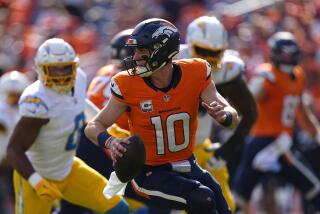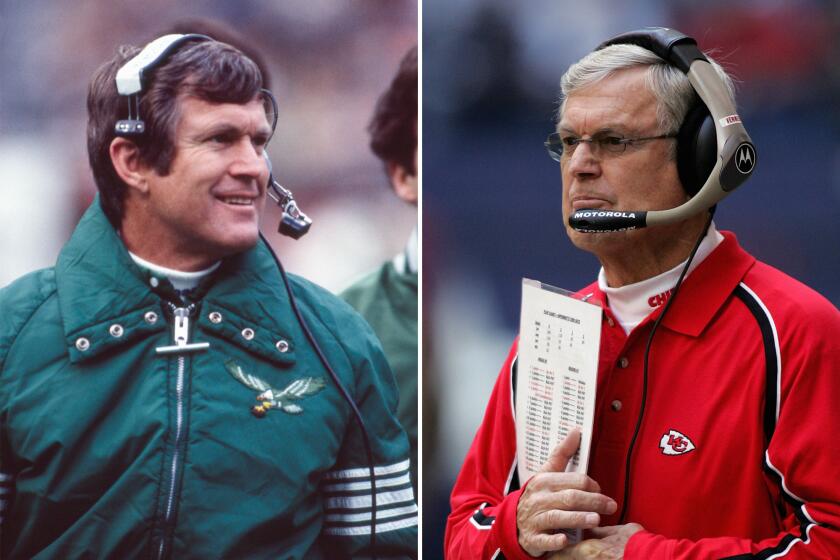Typically, Bully Boys Run Wild
- Share via
Ho-hum. Another wipeout.
Chalk up another one for brute strength.
The puncher won. The boxer ran out of room. He could run but he couldn’t hide.
The guy with short money couldn’t match the pot.
The rich got richer.
Nice try, Denver. It’s hard to win with a busted straight. Or a busted nose.
The cat ate the canary, as usual. The rabbit didn’t get the hunter.
Goliath won this one. The bull got the matador.
Listen, if you liked the second half of Super Bowl XXI, we’ll send you a set of Himmler’s home movies.
If this was a contest, so was the Johnstown Flood. So was the iceberg and the Titanic.
The Broncos had a great first half. But so did Custer. And the German Army.
The second half was like watching a truckload of chickens go over a cliff. It was as one-sided as the bombing of Rotterdam.
The race may not always go to the swift or the battle to the strong--but it did Sunday. It does most Sundays, to tell you the truth.
Super Bowl XXI ended at 7 minutes 40 seconds of the second quarter Sunday. Denver was leading at the time, 10-7, but the Giants finally sent their calling card. Denver had the ball on the Giant one-yard-line, first down and goal to go.
Denver ran three running plays. This is a bit of strategy that ranks with trying to bite a lion. The Broncos had 36 inches to go when they started and 6 yards to go when they finished. Then their field goal kicker missed a three-pointer that he should have made left-footed.
And that, students, was the old ball game.
There’s an old saying: When you shoot at a king, be sure you kill him.
Never wound a lion.
And if you get the ball on the one-yard line of the Giants, it’s a good idea to make that yard. Otherwise, you find yourself running for your life.
It’s demoralizing not to make a yard in three plays. It was as if the Broncos suddenly noticed the Giants had teeth.
A few plays later, the Giants chased Denver’s John Elway into his end zone and tackled him for a safety and two points.
It was like when Joe Louis got home the right. The party was over.
You’re not supposed to be able to tackle John Elway anywhere, much less his own end zone.
John Elway is supposed to be able to get across a freeway rush hour without getting his hair mussed.
John Elway is good, but he wasn’t born in a manger. He couldn’t handle the New York Giants all by himself. You need the National guard for that.
The press releases say the New York quarterback, Phil Simms, was the most valuable player in this tournament.
I guess a case could be made, but I beg to differ.
Wars are won in the trenches. That’s why they call the infantry the Queen of Battle.
That’s why I’d vote for infantryman Leonard Marshall.
Leonard Marshall is a New York football player roughly the size of a small Alp. If he had wheels, you could move a load of coal with him.
He plays defensive end for the Giants, not a glamour position but not a head waiter or a desk clerk, either.
The headlines all go to the offense or the linebackers who are football’s version of the interceptors, the flying circuses of the game.
The New York Giants knew they had to keep John Elway out of the game if they were to succeed Sunday. They knew Denver didn’t have much else to scare anybody.
This is where Leonard Marshall came in. Leonard Marshall is a guy who is expected to spend more time in the other team’s backfield than the ball. He comes off the ball like a runaway truck and rolls up the blockers like an old rug on his way to the quarterback.
Big Daddy Lipscomb once described the position and the job succinctly: “You just wade in and grab everybody who gets in your way till you find the one with the ball. Him, you keep.”
Big Daddy Marshall can’t head-slap people the way Big Daddy Lipscomb could. But his job was to shake off guys grabbing his jersey till he could force John Elway into the pocket. Passing out of the pocket, John Elway is a junk pitcher. Passing out of a running start with a panicky secondary in front of him, he’s as dangerous as a baby with a machine gun.
“We knew one guy couldn’t beat us,” Leonard Marshall was to observe after the game. “But that didn’t mean you could lay back and let him try.”
In the sophisticated scheme of football today, a pass rush--which used to be a four-man assault on the drop-back passer--is a three-man game. That means, among other things, that three men have to do the work of four.
In the first half Sunday, the three-man rush was given over to fancy footwork, called in the lexicon of the game stunting and looping. English translation: ballroom dancing.
That isn’t Leonard Marshall’s style. “Elway embarrassed me a little when he ran for that touchdown (a four-yard quarterback draw in the first quarter). In the second half, we went to a straight-ahead pass rush, sometimes a four-man rush. That’s when we kept him in front of us.”
Elway spent the rest of the day like a guy tied to the track with the express on time and coming at 60 miles per. He could have done better in quicksand.
On the safety, foot-soldier Marshall took an inside rush and came so fast Elway had to run into the arms of George Martin.
It was a win for old-fashioned football and the old-time league that has found a way to revive the old head-knocking football and mash the guys trying to jab and slip and dance their way to wins.
New York fans haven’t had so much fun since the old Yankees used to win World Series games, 18-4. Like the Yankees, they let you fancy your way around for a while--then they clobber you with the big inning. It’s bully-boy football but it’s now won three Super Bowls in a row for the grandfather conference, scoring 38, 46 and 39 points in the process.
It’s bad theater. It’s the wolf eating Little Red Riding Hood, the outlaws taking over the town. But it’s the way to bet.
More to Read
Go beyond the scoreboard
Get the latest on L.A.'s teams in the daily Sports Report newsletter.
You may occasionally receive promotional content from the Los Angeles Times.










